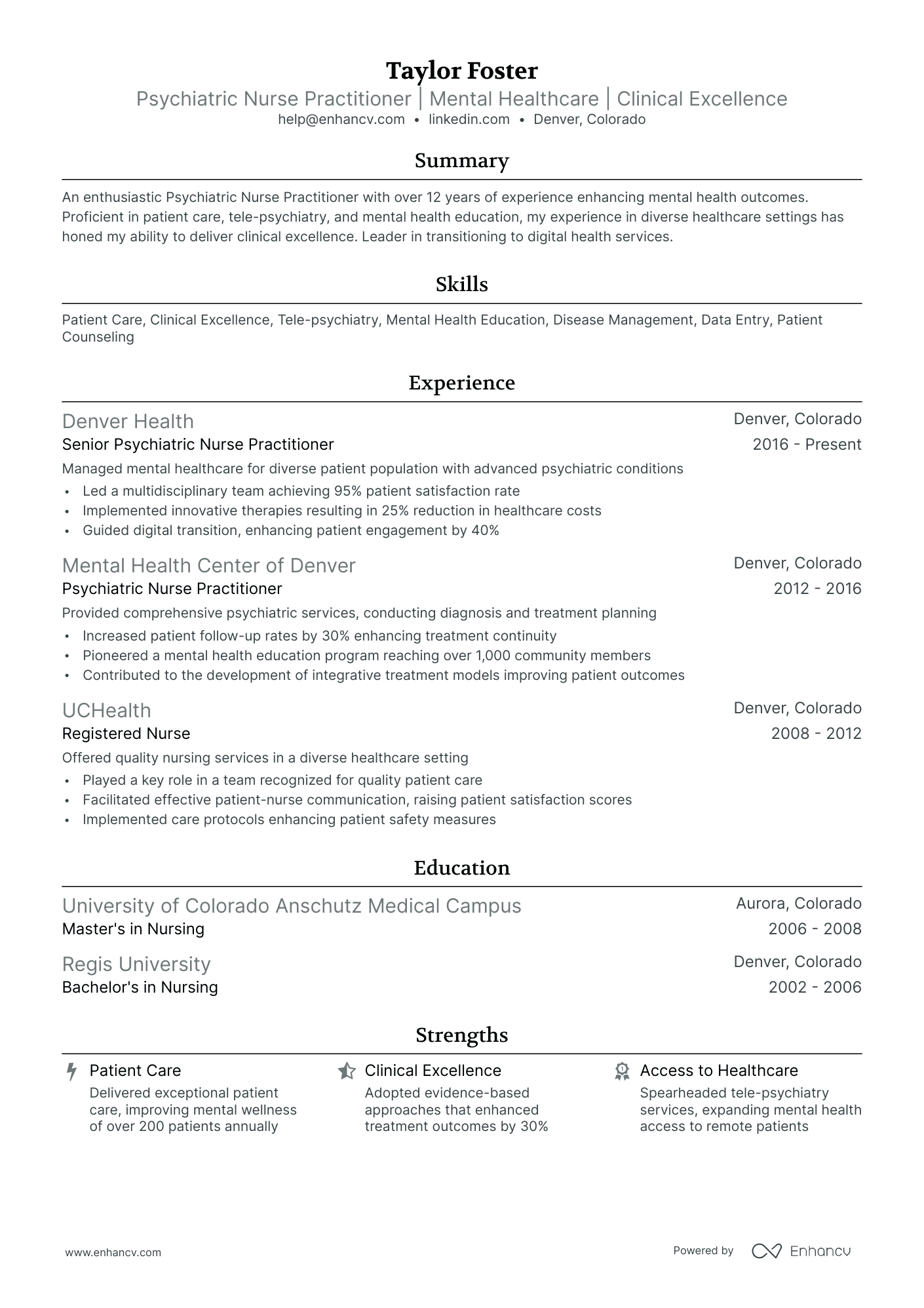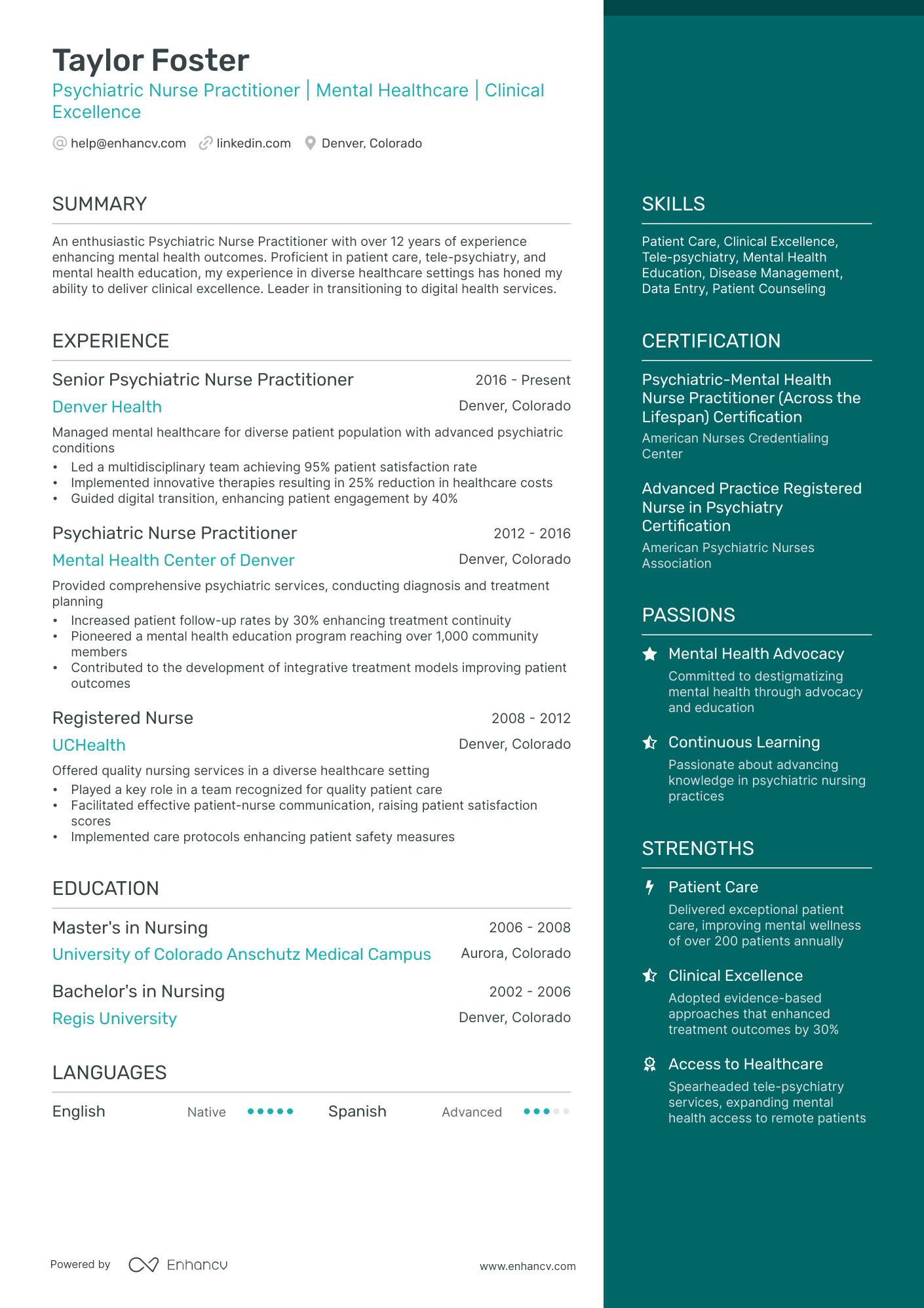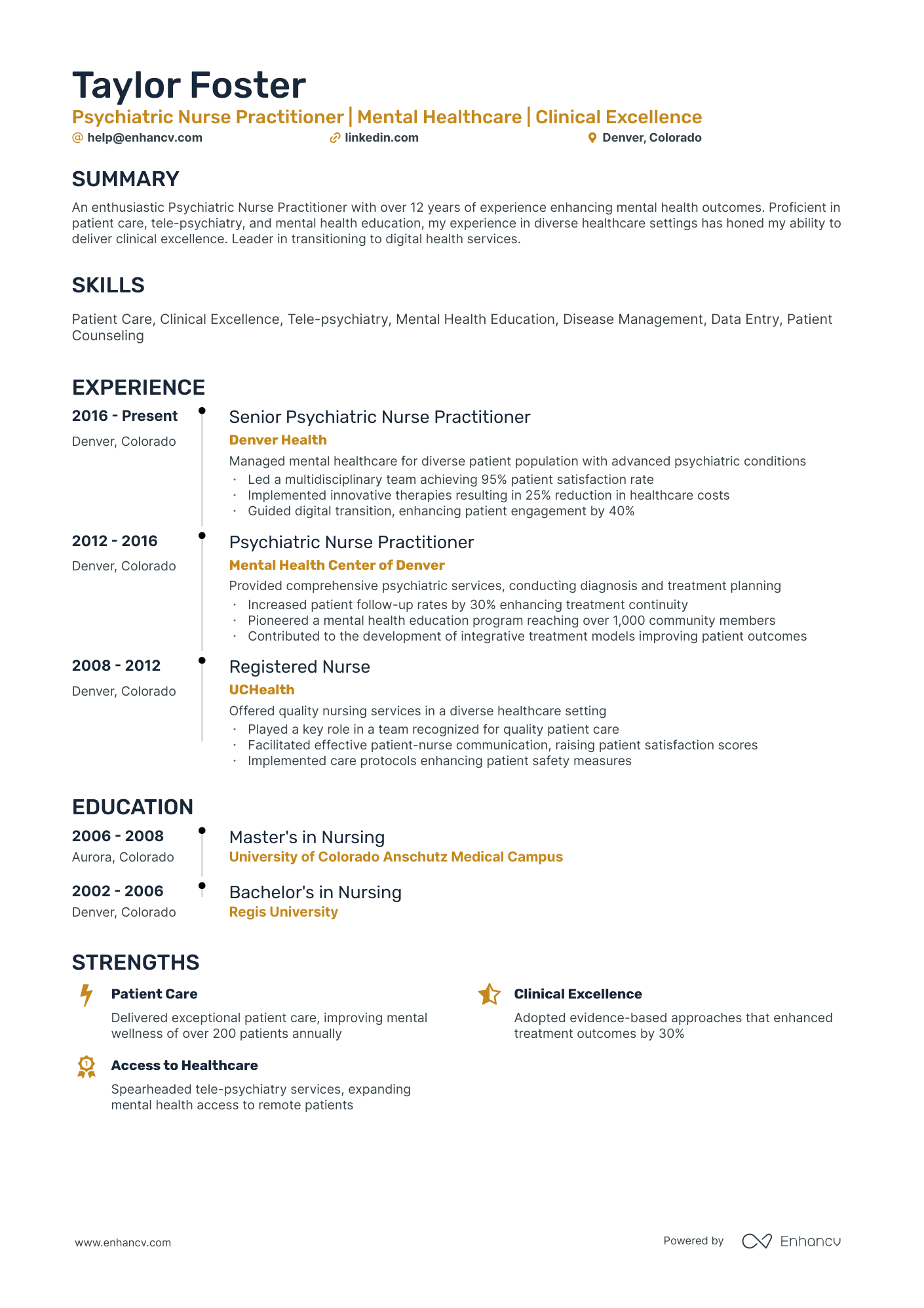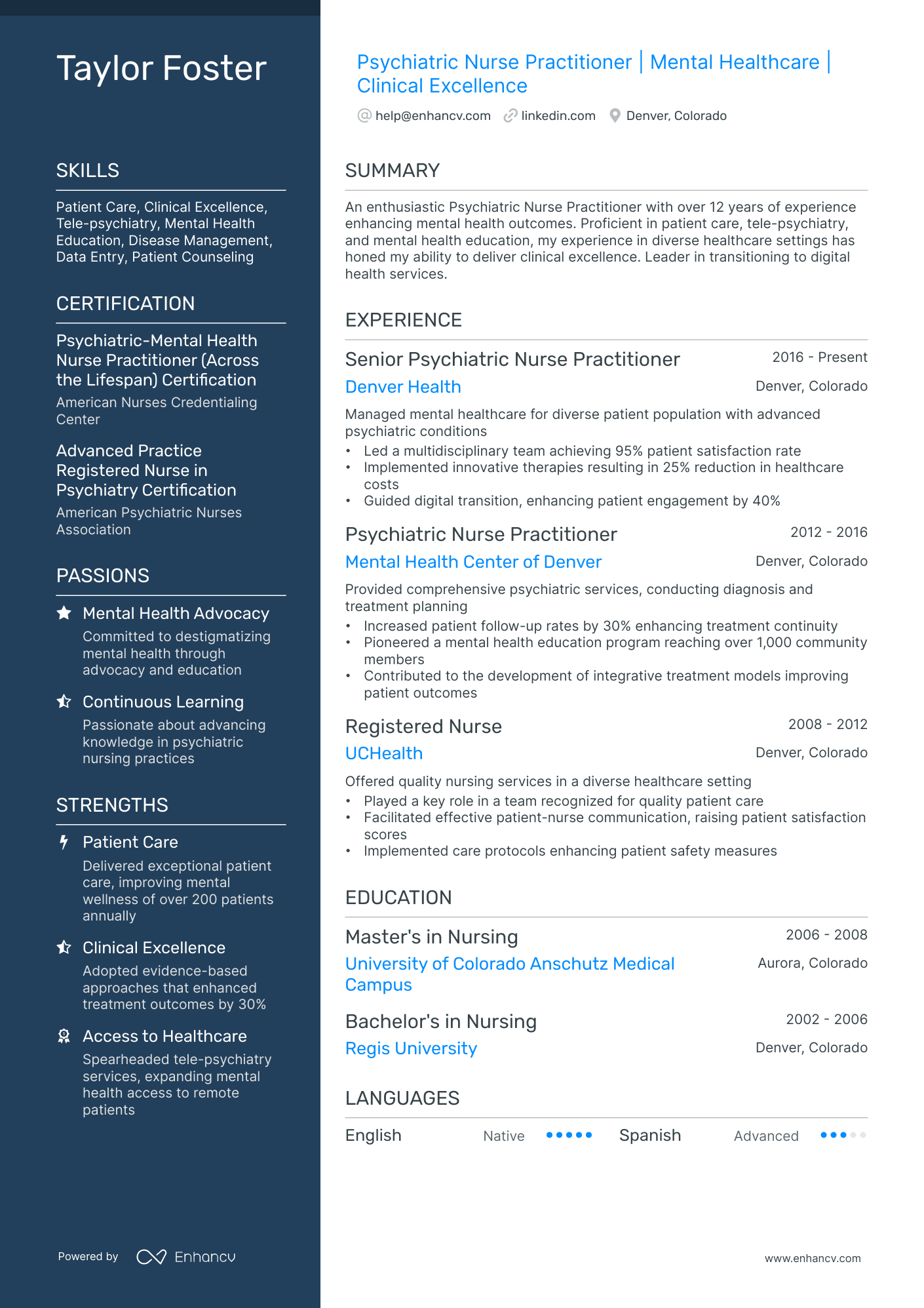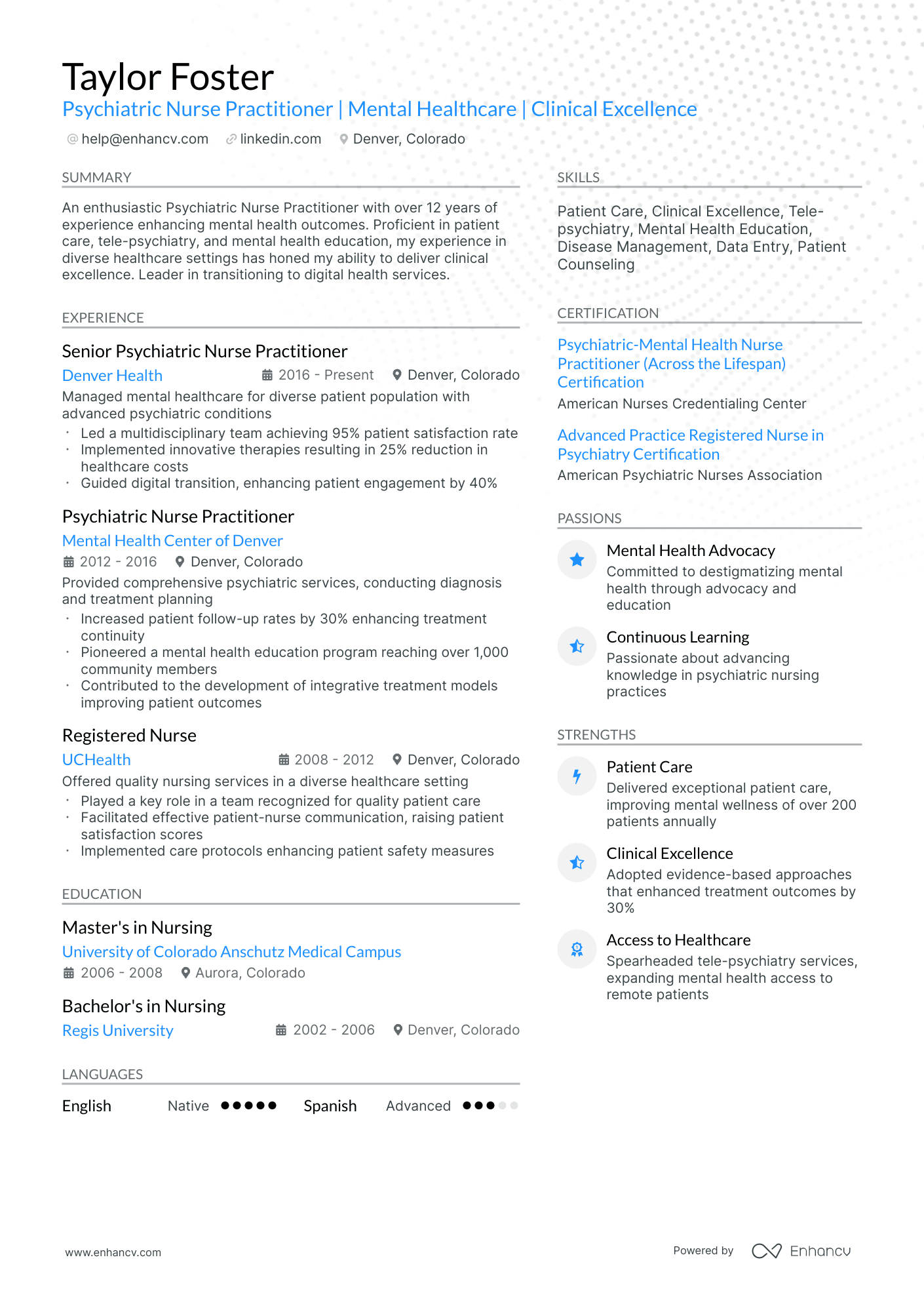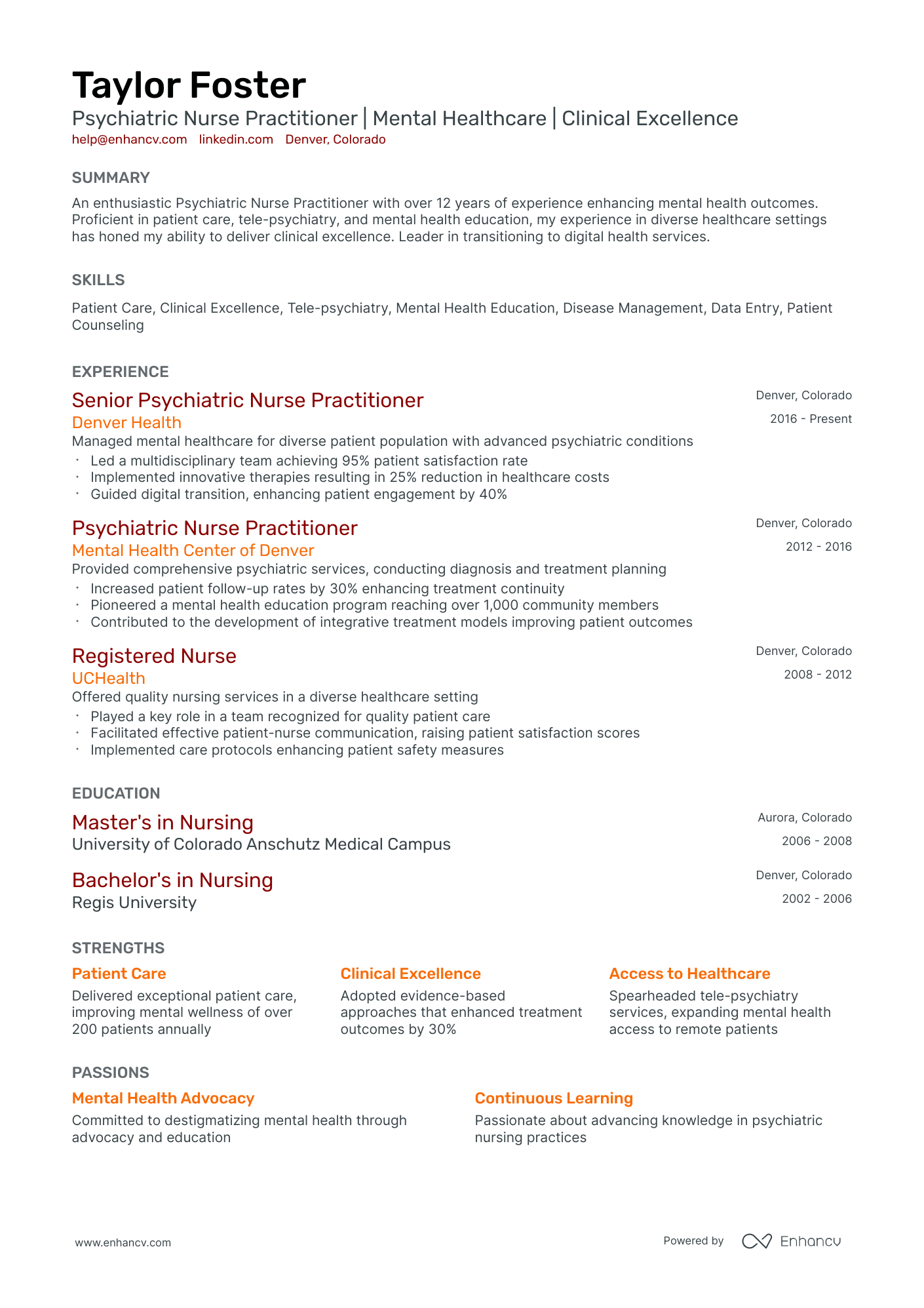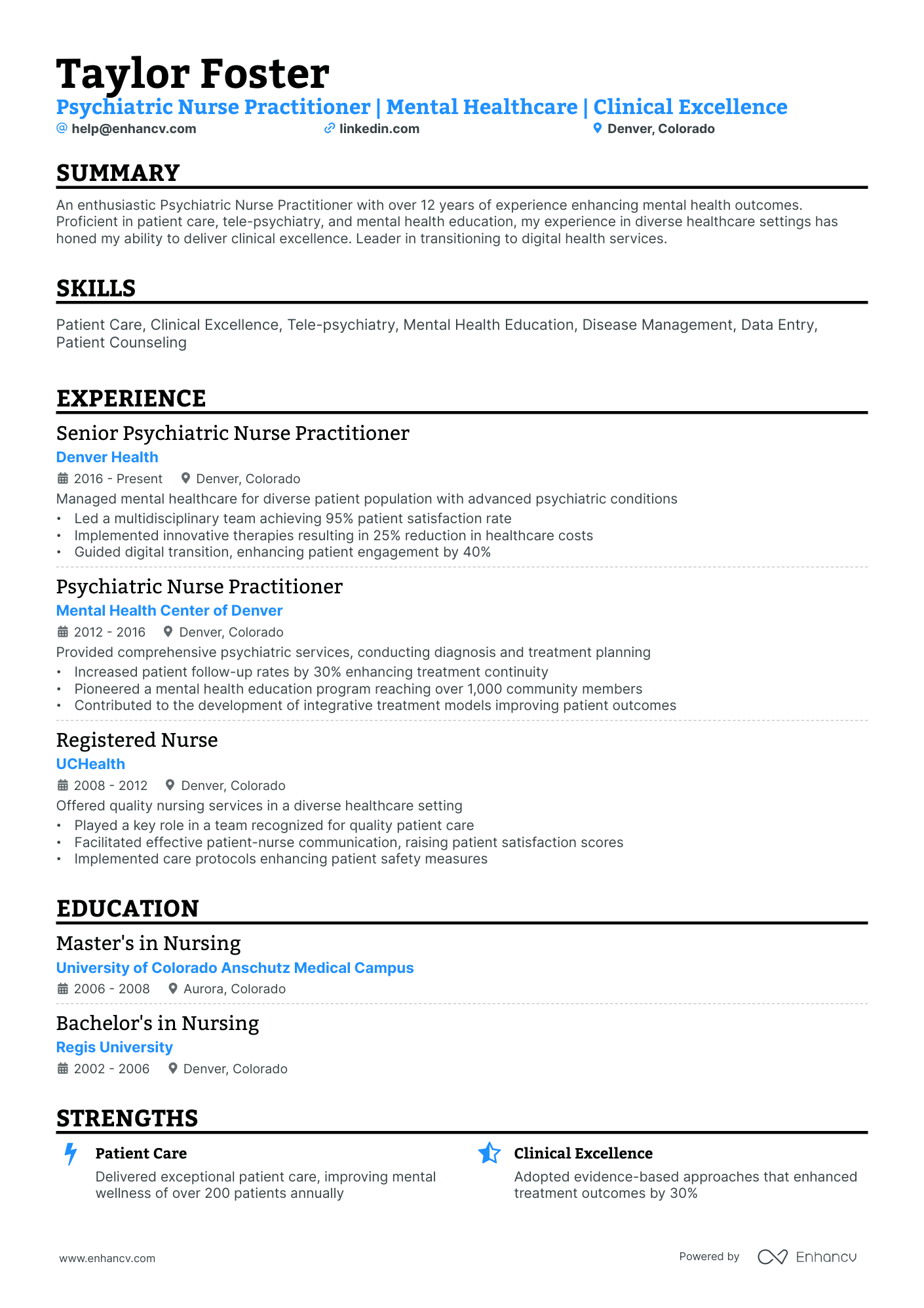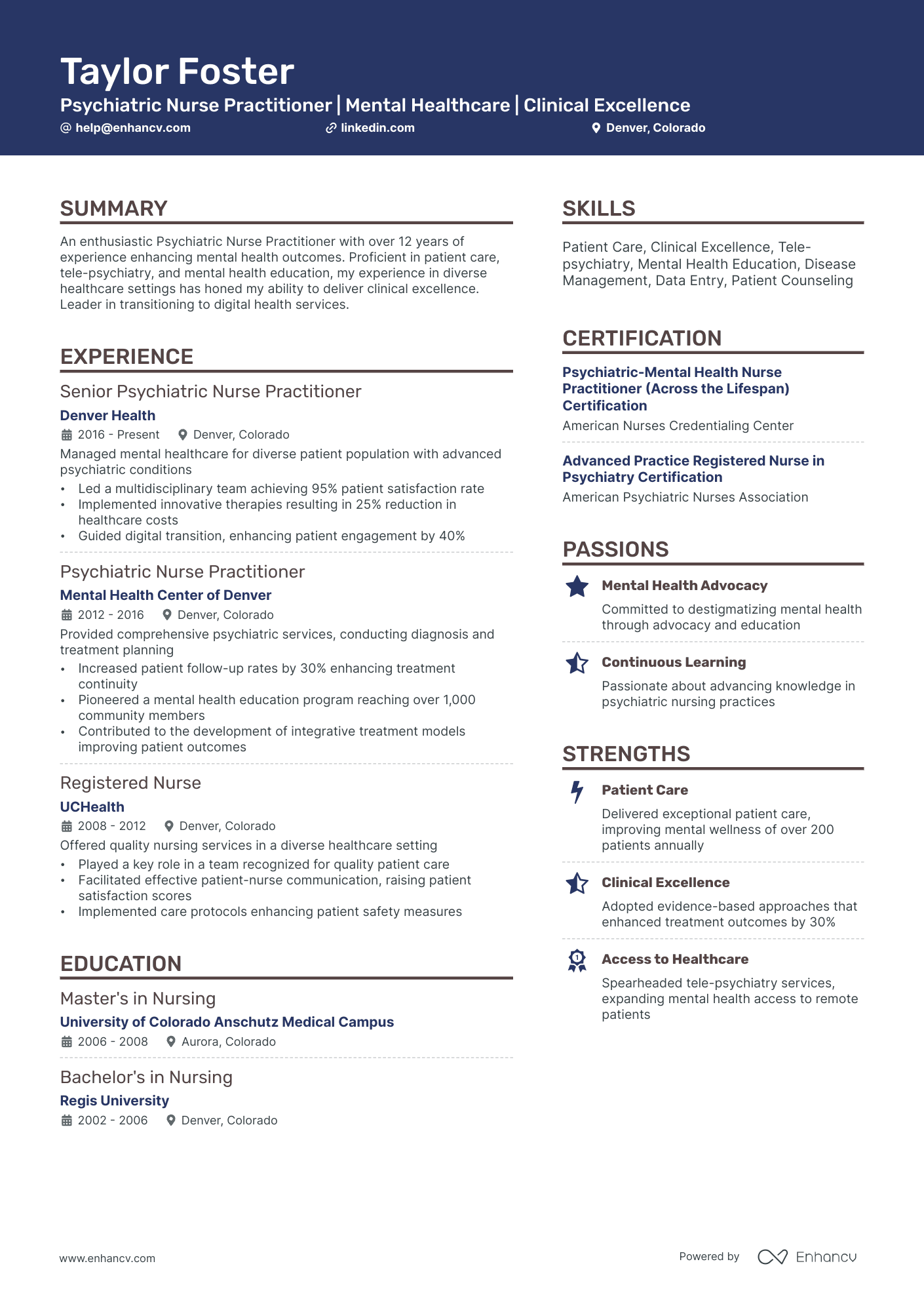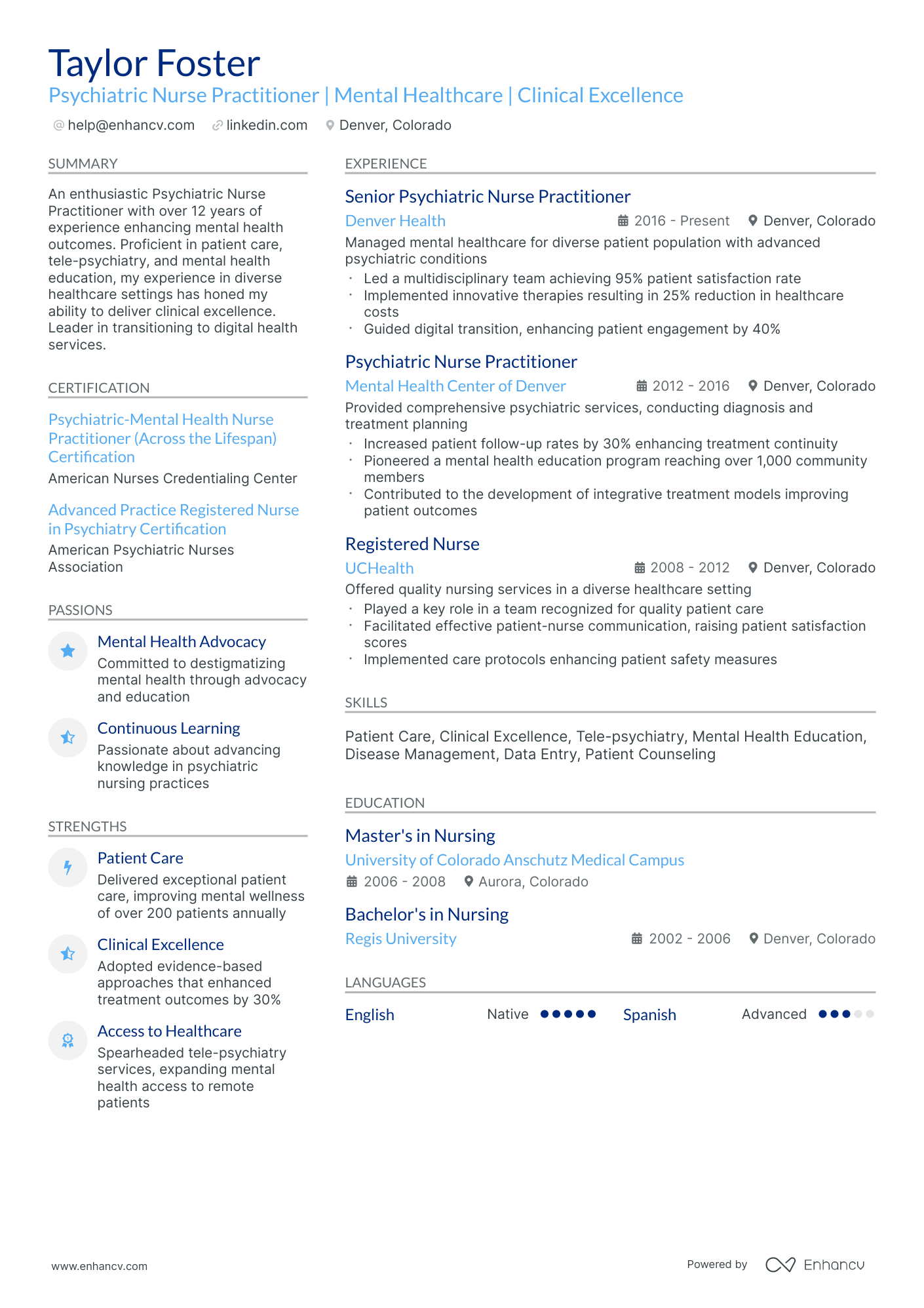Psychiatric nurse practitioners often struggle to effectively convey their specialized skills and experiences in mental healthcare within the limited space of a resume. Our guide can assist by outlining strategic methods to succinctly articulate these competencies, ensuring that the most relevant expertise and accomplishments are highlighted for potential employers.
Here's what you'll read within our professional resume guide:
- Psychiatric nurse practitioner resumes that are tailored to the role are more likely to catch recruiters' attention.
- Most sought-out psychiatric nurse practitioner skills that should make your resume.
- Styling the layout of your professional resume: take a page from psychiatric nurse practitioner resume examples.
- How to write about your psychiatric nurse practitioner achievements in various resume sections (e.g. summary, experience, and education).
Recommended reads:
Demystifying the psychiatric nurse practitioner resume format
While a touch of creativity can be appealing, it's the clarity and relevance of your psychiatric nurse practitioner resume format that truly resonates with recruiters.
To ensure your resume not only captures attention but also maintains it, consider these four streamlined steps:
- If your career boasts a wealth of pertinent and recent accomplishments, the reverse-chronological resume format is your ally. It naturally emphasizes your experience, placing your most recent roles at the forefront.
- Design a straightforward header: incorporate your contact information, a headline reflecting the position you're vying for or your current designation, and a link to your professional portfolio.
- While brevity is key, if you're targeting a senior position or have accumulated over ten years of industry-relevant experience, extending your resume to two pages is permissible.
- To ensure consistent formatting across various platforms, always save and submit your psychiatric nurse practitioner resume as a PDF.
Upload your resume
Drop your resume here or choose a file. PDF & DOCX only. Max 2MB file size.
Pro tip
If you don't happen to have that much relevant experience for the role, you could select a different format for your resume. Popular choices include:
- functional skill-based resume format - that puts the main focus on your skills and accomplishments;
- hybrid resume format - to get the best of both worlds with your psychiatric nurse practitioner experience and skills.
The five (plus) definite sections your resume for a lead engineer job should include are:
- Header with your headline, contact details, and/or a preview of your work
- Summary (or objective) to pinpoint how your success aligns with the role
- Experience with bullets of your most relevant achievements in the field
- Skills to integrate vital job requirements (both technical and personal)
- Your further dedication to the field, showcased via relevant higher education and/or certifications
What recruiters want to see on your resume:
- Advanced Education: Details about your educational qualifications, particularly your MSN (Master of Science in Nursing), PMHNP-BC (Psychiatric-Mental Health Nurse Practitioner-Board Certified) status, or DNP (Doctor of Nursing Practice).
- Clinical Experience: Evidence of your hands-on clinical practice experience with various psychiatric disorders across different age groups.
- Medication Management Skills: Your ability to prescribe and manage psychotropic medications effectively for patients based on their unique mental health needs.
- Psychotherapy Proficiency: Experience in providing psychotherapy treatments like CBT (Cognitive Behavioral Therapy), group therapy, or family counseling.
- Interpersonal and Communication Skills: Demonstration of strong skills in patient communication, empathy, and building therapeutic relationships, as well as team collaboration within a multidisciplinary setting.
Recommended reads:
Writing your psychiatric nurse practitioner resume experience
Here are some quick tips on how to curate your psychiatric nurse practitioner professional experience:
- Always ensure that you quantify your achievements by implementing the Situation-Task-Action-Result framework;
- When writing each experience bullet, make sure you're using active voice;
- Stand out by including personal skills you've grown while at the job;
- Be specific about your professional experience - it's not enough to say you have great communication skills, but rather explain what your communication track record led to?
Wondering how other professionals in the industry are presenting their job-winning experience? Check out how these psychiatric nurse practitioner professionals put some of these best practices into action:
- Provided comprehensive psychiatric care to patients in an outpatient clinic setting.
- Conducted thorough psychiatric evaluations and assessments, resulting in accurate diagnoses and treatment plans.
- Managed a caseload of over 100 patients, ensuring timely follow-up and appropriate medication management.
- Collaborated with a multidisciplinary team to develop and implement individualized treatment plans for patients with complex mental health needs.
- Led psychoeducational groups addressing topics such as stress management and coping skills, facilitating positive patient outcomes.
- Delivered psychiatric care to diverse patient population in an inpatient hospital setting.
- Administered psychotropic medications according to established protocols, closely monitoring effectiveness and side effects.
- Collaborated with psychiatrists and other healthcare professionals in treatment planning and patient management.
- Provided crisis interventions and de-escalation techniques to manage acute psychiatric emergencies.
- Participated in quality improvement initiatives to enhance patient care outcomes, resulting in improved patient satisfaction scores.
- Serve as lead psychiatric nurse practitioner in a specialized addiction treatment center.
- Assess and diagnose co-occurring mental health disorders and substance use disorders.
- Develop and implement evidence-based treatment plans, incorporating pharmacotherapy and psychotherapy modalities.
- Collaborate with social workers and counselors to provide comprehensive care addressing the holistic needs of patients.
- Conduct group therapy sessions focused on relapse prevention, resulting in reduced substance use incidents among participants.
- Provided psychiatric evaluations and medication management for adult and geriatric patients in a long-term care facility.
- Developed protocols to reduce the overuse of psychotropic medications, leading to a 30% decrease in polypharmacy-related adverse effects.
- Educated nursing staff on mental health topics, enhancing their ability to identify and address behavioral health issues in residents.
- Collaborated with family members and caregivers to develop individualized care plans, promoting patient well-being and quality of life.
- Led interdisciplinary team meetings to ensure coordinated care and effective communication among healthcare professionals.
- Managed outpatient psychiatric clinic providing specialized care for children and adolescents.
- Conducted comprehensive psychiatric assessments, including developmental and psychosocial evaluations.
- Collaborated with schools and educational institutions to develop individualized education plans (IEPs) for students with mental health needs.
- Implemented evidence-based treatment interventions, including play therapy and family therapy, resulting in improved functioning and academic performance.
- Participated in research projects examining the effectiveness of psychopharmacological interventions in pediatric populations.
- Provided psychiatric services to inmates in a correctional facility, addressing acute and chronic mental health conditions.
- Conducted forensic evaluations and assessments, assisting in determining treatment needs and security placement.
- Led group therapy sessions focused on anger management and cognitive-behavioral interventions to reduce recidivism rates.
- Collaborated with correctional officers and mental health staff to ensure safe and therapeutic environments for patients.
- Developed discharge plans and coordinated follow-up care to facilitate successful reintegration into the community.
- Provide telepsychiatry services to underserved rural communities, overcoming barriers to access mental healthcare.
- Conduct virtual psychiatric evaluations, prescribing appropriate medications and offering evidence-based treatment recommendations.
- Collaborate with local primary care providers to ensure coordinated care and comprehensive treatment approaches.
- Deliver culturally sensitive care, adapting treatment plans to meet the unique needs and preferences of diverse populations.
- Participate in ongoing professional development and training to stay updated on the latest advancements in telepsychiatry.
- Managed a specialized psychiatric clinic for veterans, providing trauma-informed care and addressing post-traumatic stress disorder (PTSD).
- Administered evidence-based treatments, such as Eye Movement Desensitization and Reprocessing (EMDR) therapy.
- Collaborated with social workers and case managers to connect veterans with community resources and support services.
- Led peer support groups to foster camaraderie and provide a safe space for veterans to share experiences and coping strategies.
- Implemented outcome measures to evaluate treatment effectiveness and continuously improve the quality of care.
- Provided psychiatric consultation-liaison services in a general hospital, supporting patients with comorbid medical and mental health conditions.
- Conducted capacity assessments and assisted in decision-making processes for patients with impaired decisional abilities.
- Collaborated with medical teams to develop integrated care plans that addressed both physical and mental health needs.
- Delivered education and training sessions to healthcare professionals on topics related to mental health and psychiatric disorders.
- Participated in quality improvement initiatives, leading to improved identification and management of psychiatric comorbidities.
- Serve as a psychiatric nurse practitioner in an outpatient community mental health center.
- Conduct comprehensive biopsychosocial assessments to formulate accurate diagnoses and treatment plans.
- Provide culturally competent care to a diverse patient population, including individuals from different socioeconomic backgrounds.
- Offer evidence-based psychotherapeutic interventions, such as cognitive-behavioral therapy (CBT) and mindfulness-based approaches.
- Collaborate with community organizations to facilitate access to social support services and promote holistic well-being.
The following content includes information from "O*NET OnLine" by the U.S. Department of Labor, Employment and Training Administration (USDOL/ETA). Used under the CC BY 4.0 license. The data represents the top responsibilities present on the task lists for psychiatric nurse practitioner professionals.
Top Responsibilities for Psychiatric Nurse Practitioner:
- Maintain complete and detailed records of patients' health care plans and prognoses.
- Develop treatment plans, based on scientific rationale, standards of care, and professional practice guidelines.
- Provide patients with information needed to promote health, reduce risk factors, or prevent disease or disability.
- Analyze and interpret patients' histories, symptoms, physical findings, or diagnostic information to develop appropriate diagnoses.
- Diagnose or treat complex, unstable, comorbid, episodic, or emergency conditions in collaboration with other health care providers as necessary.
- Prescribe medication dosages, routes, and frequencies, based on such patient characteristics as age and gender.
- Diagnose or treat chronic health care problems, such as high blood pressure and diabetes.
- Prescribe medications based on efficacy, safety, and cost as legally authorized.
- Recommend diagnostic or therapeutic interventions with attention to safety, cost, invasiveness, simplicity, acceptability, adherence, and efficacy.
- Detect and respond to adverse drug reactions, with special attention to vulnerable populations such as infants, children, pregnant and lactating women, or older adults.
Quantifying impact on your resume
<ul>
Navigating the resume landscape without experience
It's not uncommon for candidates lacking direct experience to secure entry-level positions. Their resumes often share these characteristics:
- They opt for a functional or skill-based format, emphasizing strengths over chronological work history.
- Transferrable skills, gleaned from diverse life and work experiences, take center stage.
- The objective section melds career highlights, the motivation behind the application, and the unique value proposition for the role.
- Skills are tailored to meet basic job prerequisites while also spotlighting any specialized expertise.
Recommended reads:
Pro tip
Remember, the experience section isn't just about traditional roles. It's a space to highlight all professional learning, whether from internships, contract roles, research projects, or other relevant experiences. If it's added value to your skill set for the psychiatric nurse practitioner role, it deserves a mention.
Psychiatric nurse practitioner resume skills: showcasing both hard and soft skills
Your psychiatric nurse practitioner resume should show recruiters your range of skills. List the tools and software you use (hard skills) and how they fit into your daily tasks. But don't stop there. Share the personal traits (soft skills) you've gained from your experiences. Here's how:
- Showcase three top career achievements.
- For each achievement, mention a hard and a soft skill you used.
- Highlight unique skills that set you apart.
- Discuss how your skills improved the workplace or team culture.
Check our list for popular hard and soft skills in the industry.
Top skills for your psychiatric nurse practitioner resume:
Electronic Health Records (EHR) systems
Psychiatric assessment tools
Medication management software
Telehealth platforms
Clinical decision support systems
Diagnostic imaging technology
Patient management systems
Mental health assessment instruments
Data analysis software
Cognitive Behavioral Therapy (CBT) tools
Empathy
Communication
Critical thinking
Active listening
Problem-solving
Team collaboration
Emotional intelligence
Cultural competence
Adaptability
Time management
Next, you will find information on the top technologies for psychiatric nurse practitioner professonals from "O*NET OnLine" by the U.S. Department of Labor, Employment and Training Administration (USDOL/ETA). Used under the CC BY 4.0 license.
Top technologies for Psychiatric Nurse Practitioner’s resume:
- eClinicalWorks EHR software
- Epic Systems
- Microsoft PowerPoint
- Microsoft Internet Explorer
- Web browser software
Pro tip
Targeting the needed job ad skills doesn't have to end with the skills section. You can talk about your related certifications, interests or additional experience via projects or volunteering, where you picked up those skills, too.
Highlighting certifications and education on your psychiatric nurse practitioner resume
Your academic achievements, including certifications and degrees, bolster your application. They showcase your skills and commitment to the field.
To effectively present these on your resume:
- Highlight significant academic achievements or recognitions relevant to the role.
- Be selective; prioritize the most relevant and impressive certifications.
- Include essential details: certificate/degree name, institution, graduation dates, and license numbers (if applicable).
- Present your academic background in reverse chronological order, emphasizing the most recent and relevant qualifications.
For further guidance, explore popular industry certifications.
Best certifications to list on your resume
Pro tip
List your degrees in reverse order, starting with the newest. A recent PhD or unique field could set you apart.
Recommended reads:
Crafting the psychiatric nurse practitioner resume summary or objective: a blend of achievements, aspirations, and uniqueness
Whether you opt for a resume summary or objective depends on your career trajectory.
- If you have a rich tapestry of relevant achievements, a resume summary can spotlight these accomplishments.
- If you're relatively new or transitioning, a resume objective can articulate your aspirations and how they align with the role.
Regardless of your choice, this section should encapsulate your unique value proposition, blending your technical and interpersonal strengths.
Resume summary and objective examples for a psychiatric nurse practitioner resume
Offering 10+ years of experience as a psychologist, I aim to apply my extensive knowledge in cognitive behavioral therapy and trauma-focused therapy to practice as a psychiatric nurse practitioner in New York. Recognized for implementing effective mental health programs leading to a 40% increase in patient recovery rates.
Highly skilled Medical Doctor enthusiastic about transitioning into a psychiatric nurse practitioner role based in Chicago. With a strong background in diagnosing and managing psychiatric conditions, I am adept at medication management with a focus on improving patients' quality of life.
After dedicating over 15 years to social work in San Francisco, I'm eager to transition into a psychiatric nurse practitioner role, bringing a unique perspective informed by deep hands-on experience with diverse populations and crisis intervention techniques. Adept at utilizing therapeutic communication and evidence-based care.
A seasoned pharmaceutical researcher based in Seattle now seeks to deliver direct patient care as a psychiatric nurse practitioner. Combines a solid understanding of psychopharmacology and a passion for mental health advocacy to provide compassionate, patient-centered care.
As a recent Nursing graduate from Houston, I seek an opportunity to launch my career as a psychiatric nurse practitioner. Committed to applying learned psychiatric assessment skills and person-centered treatment planning to enhance mental health outcomes for patients.
An enthusiastic new nursing graduate based in Boston desires to kick-start a career as a psychiatric nurse practitioner. Aim to utilize my strong academic foundation in psychiatric nursing, excellent communication skills, and passion for mental health to provide exceptional patient care.
Additional sections to elevate your psychiatric nurse practitioner resume
Recruiters often seek candidates who offer more than just the basics.
To stand out, consider adding:
- Interests: Share hobbies or activities that reveal your personality and transferable skills.
- Projects: Highlight innovative work that showcases your expertise.
- Languages: If communication is vital for the role, showcase your linguistic abilities.
- Awards: Feature significant recognitions that underscore your expertise.
Key takeaways
- Structure your resume to spotlight career highlights and relevance to the role.
- Keep your resume concise, prioritizing relevant experiences.
- Detail specific achievements that showcase your suitability for the role.
- Both technical and interpersonal skills should be evident throughout your psychiatric nurse practitioner application.
